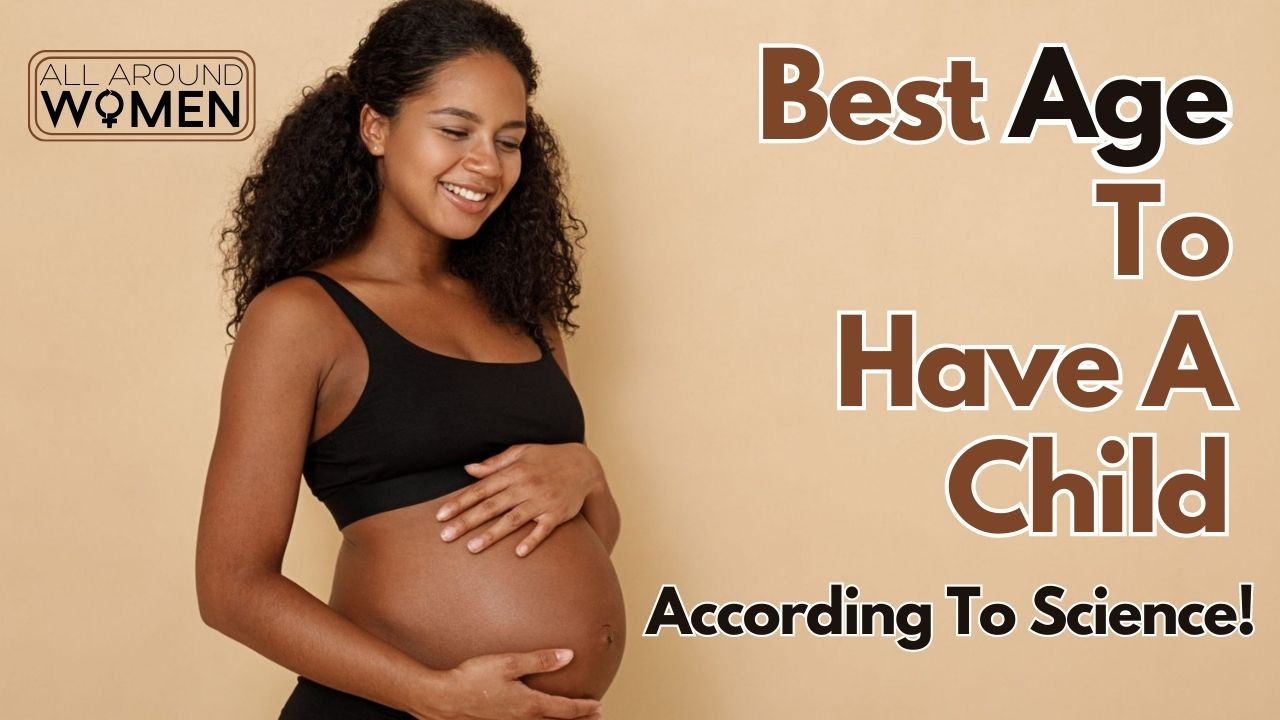Science has uncovered the secret to the perfect age to have a child, and it is bound to captivate your attention! Whether you are a future parent, a curious soul, or simply seeking insight into the marvels of life, this revelation is for you. Join us on a journey where empirical evidence meets fascinating revelations as we explore the realm of childbearing. From the physical to the emotional, the biological to the social, we will unveil the absolute best age to commence the adventure of parenthood.

Biological aspect
Biologically, the optimal age to have a child is a complex matter influenced by various factors. In a woman’s twenties, her reproductive system is typically at its prime. The quality and quantity of eggs are at their highest, increasing the chances of successful conception and healthy pregnancy. Additionally, the risk of pregnancy complications, such as gestational diabetes and high blood pressure, tends to be lower during this age range.
As women reach their thirties and beyond, fertility gradually declines. The number of eggs decreases, and their quality may diminish, leading to reduced fertility rates and an increased likelihood of difficulties in getting pregnant. With age, the probability of genetic abnormalities such as Down syndrome rises. Furthermore, the rate of miscarriages tends to increase, possibly due to higher rates of chromosomal abnormalities in the eggs.
For men, on the other hand, the biological clock ticks at a different pace. While men experience a gradual decline in fertility as they age, their reproductive capacity remains more stable compared to women. Men generally continue to produce sperm throughout their lives. However, advanced paternal age (typically defined as over 40) has been associated with certain health risks for offspring. Several studies have found a modestly increased risk of genetic changes, such as those linked to autism and schizophrenia, in children born to older fathers.

Psychological Aspect
Psychologically, the ideal age to become a parent is different for everyone. It can vary based on personal circumstances. While individuals in their thirties and beyond may possess greater emotional maturity and stability, it is important to recognize that psychological readiness for parenthood can be achieved at different ages.
Older prospective parents often have had more time to explore their own identities, establish their careers, and cultivate a sense of self. This self-awareness can contribute to a better understanding of their own values, beliefs, and goals, which can positively impact their parenting style. Additionally, they may have accumulated life experiences and developed a broader perspective, enabling them to handle the challenges and responsibilities of raising a child with more ease.
On the other hand, younger parents may bring unique strengths to the table. Their youthful energy and enthusiasm can be valuable assets in parenting. They may have a natural inclination for adaptability, quickly adjusting to the demands and changes that come with raising a child. Younger parents may also have an innate capacity for growth and learn alongside their child, fostering a deeper connection and shared experiences as they navigate the journey of parenthood together.

Aspect of Finance
Financial considerations play a significant and vital role in the decision to have a child. Younger individuals often face financial constraints due to limited job experience and lower income levels. Starting a family at a younger age may require careful budgeting and sacrifices to meet the expenses associated with raising a child. It can be challenging to balance the costs of childcare, education, healthcare, and other essential needs while also striving for personal and professional growth.
On the other hand, waiting until one’s thirties may offer certain advantages in terms of career advancement and increased earning potential. By this age, many individuals have had time to establish themselves in their chosen professions, gaining valuable experience and opportunities for growth. This can lead to more stability and a stronger financial foundation, providing a greater ability to meet the financial demands of raising a child.
A more stable financial situation can offer numerous benefits and perks for both the parents and the child. It can provide access to quality education, healthcare, and other essential resources that contribute to a child’s overall well-being. Financial security can also alleviate some of the stress and anxieties associated with the financial responsibilities of parenting, allowing parents to focus more on nurturing and providing for their child’s emotional and developmental needs.
It is important to note that financial readiness is highly individualized and influenced by personal circumstances, resources, and support networks. Each person’s financial situation will differ based on factors such as location, occupation, savings, and familial support. Additionally, financial planning and preparation are essential regardless of the stage of life at which one decides to have a child. Creating a budget, saving for future expenses, and exploring available resources, such as government assistance programs or employer benefits, can help individuals navigate the financial aspects of parenthood more effectively.
What if you miss the ideal age?

It is important to remember that there is no one-size-fits-all approach to parenthood. While there are certain biological, psychological, and financial factors to consider, there is no strict deadline or expiration date for starting a family.
– If you find yourself beyond the perceived ideal age, there are still various options available to fulfill your desire to become a parent. Here are a few possibilities:
- Assisted reproductive technologies: Advancements in medical science have made it possible for individuals and couples to overcome fertility challenges. Techniques such as in vitro fertilization (IVF), egg or sperm donation, and surrogacy can help individuals and couples conceive even if they have encountered age-related fertility issues.
- Adoption: Adoption provides an opportunity to become a parent regardless of age. There are several kinds of adoption, including open and closed adoption, domestic and international adoption, and fostering with the possibility of adoption. Each choice has its own set of criteria and processes, so it’s critical to investigate and grasp your jurisdiction’s individual legislation and procedures.
- Blended families: If you have missed the ideal age for having a biological child, you may consider blending families by forming a stepfamily. Marriage or partnership with someone who already has children from a prior relationship might result in this. Blended families can provide a loving and nurturing environment for children, offering the opportunity to experience parenthood and the joys of raising a child.
- Embracing alternative paths: Parenthood can take many forms, and sometimes unconventional paths can lead to fulfilling parental roles. Some individuals choose to become mentors, guardians, or caretakers for children who may not have traditional family structures. Volunteering with organizations that support children in need can also provide opportunities to impact young lives positively.
Remember, the decision to become a parent is deeply personal, and the right time is different for everyone. While there are certain benefits to beginning having children at a younger age, it is never too late to begin the adventure of motherhood. Each path has its own unique challenges and rewards, and what truly matters is creating a loving and supportive environment for a child, regardless of age.
4 Reasons Why Having Kids Sooner Rather Than Later Might Actually Be Cheaper

1. Lower Income Sacrifice
When considering early parenthood, one key advantage is the potential for a lower income sacrifice is if one parent decides to stay at home. Younger individuals typically have fewer years of career advancement and income growth under their belts. As a result, temporarily quitting employment to care for children may have a lesser financial impact. This can help mitigate the loss of potential earnings and future career progression that may occur with an extended hiatus from work.
2. Extended Retirement Planning
Starting a family earlier in life provides more time to plan and save for retirement. By beginning the journey of parenthood sooner, parents can allocate more years to contribute to retirement accounts and engage in long-term investment strategies. The additional time allows for potential compound growth and a higher likelihood of accumulating a substantial retirement nest egg. With a longer horizon for retirement planning, individuals who have children earlier can potentially benefit from greater financial security during their golden years.
3. Creative and Cost-Conscious Parenting
Early parenthood often fosters a heightened sense of resourcefulness and the motivation to explore creative and frugal approaches to parenting. Younger parents may be more inclined to seek out cost-saving strategies, such as DIY projects, budget-friendly activities, and second-hand purchases. They may be more receptive to reusing baby items, opting for cloth diapers instead of disposable ones, or finding affordable ways to entertain and educate their children. This mindset of financial mindfulness and resourcefulness can lead to long-term savings and financial stability throughout the parenting journey.
4. Fertility Advantages
Conceiving a child may be easier for younger couples due to higher fertility rates compared to later in life. Women in their twenties generally have a higher likelihood of successful conception and lower risks of fertility-related issues. This reduces the need for expensive fertility treatments or assisted reproductive technologies, which can be financially burdensome. By starting their parenting journey earlier, couples may be able to conceive naturally, saving significant costs associated with fertility interventions.
Infographic- The best age to have a child ‘age-wise Insights’





FAQs [frequently asked questions]
Q: What is the ideal age to have a child?
A: The ideal age to have a child can vary depending on various factors, including biological, psychological, and individual circumstances. Biologically, women in their twenties are generally considered to be at their peak fertility. However, the optimal age for parenthood is subjective and can depend on personal readiness, financial stability, and emotional maturity.
Q: What happens if you miss the ideal age to have a child?
A: If you miss considered the “ideal” age to have a child, there are still options available. In vitro fertilization, (IVF) and adoption are two examples of assisted reproductive technologies that can provide avenues for individuals or couples to become parents. Additionally, blending families or exploring alternative paths, such as becoming a mentor or guardian, can also offer fulfilling parental roles.
Q: Is having kids sooner rather than later cheaper?
A: There are certain economic advantages to having children sooner rather than later. Some reasons include a potentially lower income sacrifice if one of the parents chooses to remain at home. Extended time for retirement planning and savings, motivation to find creative and cost-conscious parenting strategies and potentially easier conception due to higher fertility rates in younger individuals. However, it is important to consider individual circumstances and prioritize personal readiness when making decisions about parenthood.
Q: What financial considerations should be taken into account before having children?
A: Financial considerations before having children include assessing income stability and budgeting for child-related expenses. These include childcare, education, healthcare, and basic necessities, evaluating insurance coverage, and planning for long-term financial goals like retirement and savings. It is important to create a realistic financial plan and consider the potential impact on your overall financial well-being before starting a family.
Final Words
Determining the ideal age to have a child is a personal decision influenced by various factors. There are advantages to early parenthood in terms of economics, such as lower income sacrifice and extended retirement planning. However, it is important to consider emotional readiness and individual circumstances. Financial considerations should be balanced with other factors, and the most important aspect is creating a loving and nurturing environment for children. Finally, the choice should be based on a thorough evaluation of preparedness and support systems. Parenthood is a transformative journey, and by making informed choices, you can embark on the adventure with confidence and joy.



